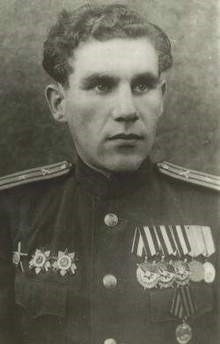
Aleksei Vysotskii
Aleksei Vysotskii was born into a Jewish family in 1919 in Kiev. According to some sources, his father Volf had three university diplomas: in law, in economics, and in chemistry. His mother Dora was a pharmacist. In the mid-1920s Aleksei's parents divorced: his father settled in Moscow while his mother remained in Kiev. At first Aleksei lived alternately either in Moscow or in Kiev. In the mid-1930s he settled in Moscow.
In 1938 Aleksei Vysotskii entered the Podolsk Artillery School (near Moscow) and in the winter of 1939-40 he took part in the Soviet-Finnish War as the commander of a howitzer platoon. With the beginning of the Soviet-German war in June 1941, as an officer in the 265th Artillery Regiment, he took part in the defense of Odessa. In August 1941 Lieutenant Vysotskii, then commander of an artillery company, was recommended for the Order of the Red Banner. Since the summer of 1941 was a period of Soviet setbacks and retreat, only a few Red Army soldiers were awarded any military awards at that time. The Order of the Red Banner was, in fact, given to Vysotskii only half a year later – in February 1942. Aleksei Vysotskii took part in fighting in Ukraine, the Crimea, and the Northern Caucasus. He was wounded twice. In the fall of 1943, Major Vysotskii began serving as the chief of staff of the headquarters of a howitzer artillery division. He took part in the liberation of Ukraine and fighting in Poland in 1944. He ended the war in Germany. He had been awarded a total of five orders and several medals.
During the war Aleksei Vysotskii turned to military journalism. His reports from the front and other materials written by him appeared on the pages of Krasnaia Zvezda (a newspaper of the Red Army) and of Izvestiia. After the war, while continuing his army service, Vysotskii graduated in 1956 from the Faculty of Journalism of Moscow University. After he retired in 1959, he devoted himself completely to being a writer. Vysotskii authored four novels set during the Soviet-German war and to postwar events, as well as a number of short stories and essays on the same topics.
Aleksei's brother Semion Vysotskii was born in 1915. He also served in the Red Army – as a military engineer in the field of communications. During the Soviet-German war, he fought in Ukraine, Poland, Germany, and Czechoslovakia. Semion was awarded Czechoslovak, as well as Soviet, military awards. His last rank was that of colonel.
Semion's Vysotskii's only son Vladimir Vysotskii (1938-1980) was a famous Russian "bard" – a poet, songwriter, and singer (as well as a theater and movie actor). Idolized by millions of Russians, he performed his songs with a guitar, in some ways similar to Bob Dylan in North America. It was not Vladimir's father Semion (who had abandoned his family after the war), but his Uncle Aleksei (who had two children of his own), who brought up and shaped the future bard. It was Aleksei who provided a model for Vladimir. It was also he who made the first professional tape recordings of Vladimir's performances (in 1962). While the Soviet authorities were ambivalent about Vladimir Vysotskii's songs, Aleksei's tape recordings, in millions of copies, circulated and were popular throughout the Soviet Union, from westernmost Lvov to Kamchatka in the Far East.
Aleksei Vysotskii, Uncle Aleksei, died in 1977.






